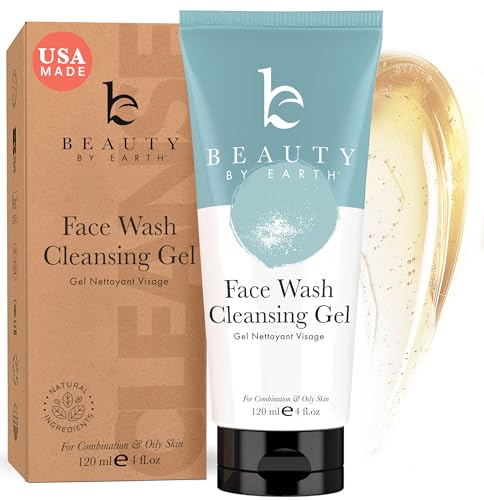
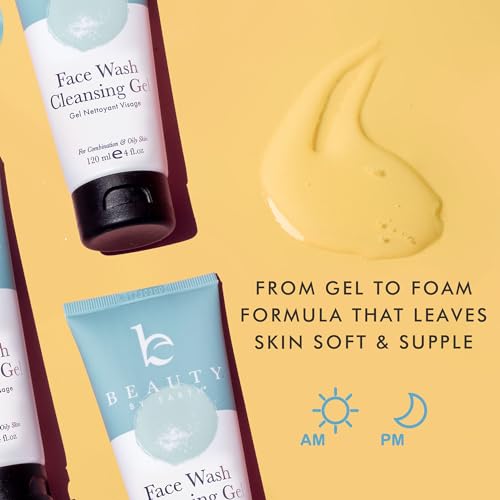
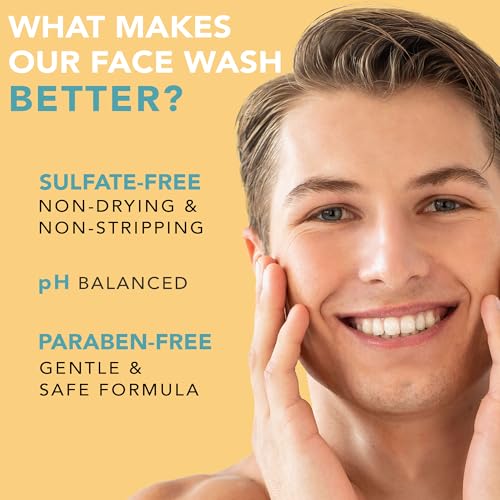
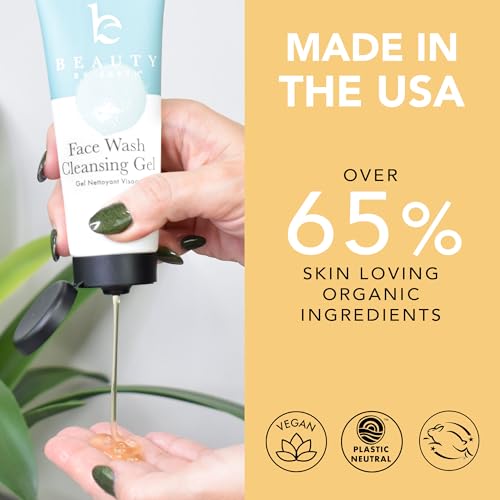
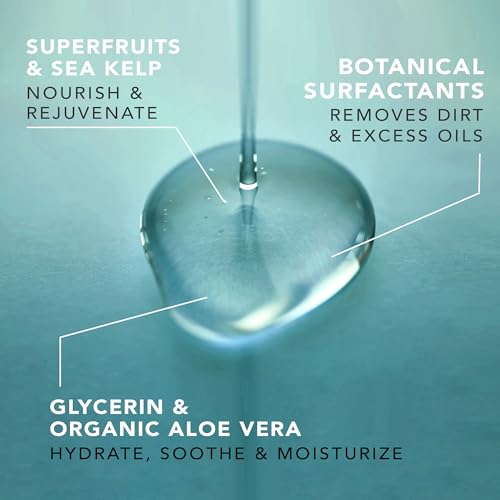
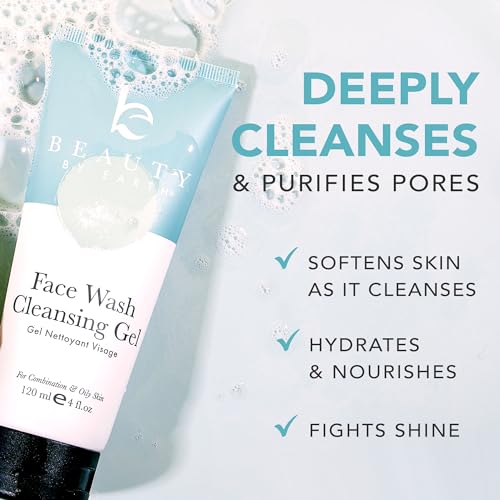
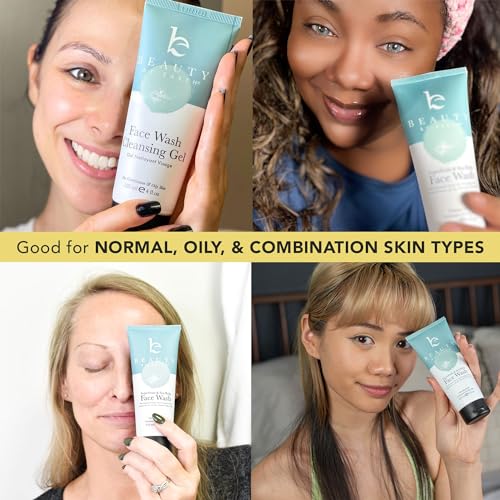
Natural Face Wash - Cleanses Impurities, Gentle for Sensitive Skin - 8oz USA Made


Mentha Piperita (Peppermint) Oil
High RiskMentha piperita (peppermint) oil is a volatile oil extracted from the leaves of the peppermint plant, known for its strong aroma and flavor. It is commonly used in cosmetics and personal care products for its cooling properties and fragrance enhancement.
Sustai Insights
Peppermint oil offers functional benefits such as antimicrobial properties and a soothing sensation on the skin. However, it is associated with a high potential for allergies and skin irritation. Regulatory bodies impose certain restrictions on its use due to these concerns. The overall risk level is assessed as high, warranting caution in usage, especially for sensitive populations. Alternatives like spearmint oil may provide similar benefits with potentially lower irritation risks.
Cymbopogon (Lemon Grass) Oil
High RiskCymbopogon (lemongrass) oil is an essential oil derived from the leaves and stalks of lemongrass plants. It is primarily used for its aromatic properties in cosmetics and personal care products, serving as a fragrance component and potential antimicrobial agent.
Sustai Insights
Lemongrass oil offers functional benefits as a natural fragrance and antimicrobial agent. However, it has a high allergenic potential, which may cause skin sensitization or irritation. Environmental concerns include possible irritation to aquatic life if released into water systems. Regulatory bodies advise caution due to its enhanced skin absorption properties. Overall, the ingredient presents a high-risk profile, necessitating careful consideration in formulation. Safer alternatives may include synthetic fragrances or other essential oils with lower allergenic profiles.
Laminaria Digitata Powder
Medium RiskLaminaria digitata powder is a powder derived from the Laminaria digitata seaweed, commonly used in cosmetic and personal care products. It serves various functions including acting as a thickening agent and providing skin-conditioning properties.
Sustai Insights
Laminaria digitata powder offers functional benefits such as enhancing product texture and skin hydration. It is sustainably sourced from marine environments, contributing to its eco-friendliness. Health risks are low, with minimal concerns regarding carcinogenicity, allergies, or reproductive toxicity. However, contamination concerns are notable, necessitating careful sourcing. Regulatory restrictions exist for certain applications, categorized overall as moderate risk. Usage should be monitored to minimize potential contamination, and alternatives like other seaweed extracts may provide similar benefits with potentially lower risks.
Glycerin
Medium RiskGlycerin (also called glycerol) is a naturally occurring compound commonly used in personal care and cosmetic products. It functions as a humectant, attracting moisture to the skin, and is also utilized as a solvent and emollient to enhance product texture and stability.
Sustai Insights
Glycerin is valued for its effective moisturizing properties and biodegradability, making it a widely accepted ingredient in formulations. It poses low health risks, including low concerns for carcinogenicity and allergies. However, moderate use restrictions exist due to regulatory guidelines. While glycerin does not significantly contribute to environmental pollution, its production process should be ethically sourced. Overall, glycerin holds a medium risk level, emphasizing the importance of safe usage practices and considering sustainable alternatives.
Citric Acid
Medium RiskCitric acid is an alpha hydroxy acid used in personal care products primarily for its role as a pH adjuster and natural preservative. It occurs naturally in citrus fruits and is commonly utilized in various formulations for its chelating properties and mild exfoliation benefits.
Sustai Insights
Citric acid offers functional benefits as an effective preservative and pH stabilizer, contributing to product longevity and stability. It is biodegradable and derived from renewable sources. Health risks are low, with minimal concerns regarding carcinogenicity, allergies, and reproductive toxicity. However, moderate use restrictions exist due to potential irritation at high concentrations. Environmental risks are limited, as citric acid is not known to accumulate in ecosystems. Regulatory agencies have no significant advisories against its use. Overall, it is assessed as a medium-risk ingredient, with safe usage practices recommended and alternatives available.
Potassium Sorbate
Medium RiskPotassium sorbate is a potassium salt of sorbic acid, primarily used as a preservative in food and cosmetic products. It inhibits the growth of molds, yeast, and some bacteria, extending the shelf life of products. It is commonly found in various formulations due to its effectiveness and low toxicity.
Sustai Insights
Potassium sorbate serves as an effective preservative, preventing microbial growth in food and cosmetic products, which is vital for safety and longevity. Although it has a low risk of carcinogenicity and developmental toxicity, there is a moderate concern regarding allergies and immunotoxicity. Environmentally, it poses minimal risks as it is not significantly bioaccumulative. Regulatory agencies have verified its use, although some products may face restrictions. Overall, it is assessed as a medium risk ingredient, with safe usage practices recommended, and alternatives such as natural preservatives could be considered.
Camellia Oleifera (Tea Oil Camellia) Leaf Extract
Low RiskCamellia oleifera (tea oil camellia) leaf extract is an extract obtained from the leaves of the Camellia oleifera plant, primarily utilized for its functional properties in cosmetic and personal care products. It is valued for its potential moisturizing and soothing attributes.
Sustai Insights
Camellia oleifera leaf extract offers beneficial functional properties, such as moisturizing and soothing effects on the skin. It is sustainably sourced and generally recognized as safe, with low health risks related to carcinogenicity, allergies, and reproductive toxicity. Environmental concerns are minimal, as the ingredient does not bioaccumulate or contribute significantly to pollution. Regulatory assessments show no current restrictions, confirming its safety for use. Overall, the ingredient is considered low risk, with no major adverse effects reported, making it a suitable choice in formulations.
Lauryl Glucoside
Low RiskLauryl glucoside is a sugar- and lipid-based surfactant commonly used in personal care products. It functions as a mild cleanser and emulsifier, helping to solubilize oils and dirt while contributing to product texture and stability.
Sustai Insights
Lauryl glucoside offers functional benefits as a gentle surfactant that effectively cleanses without harshness, and it is biodegradable, indicating sustainable sourcing. Health risks are minimal, with low concerns for carcinogenicity and low to moderate potential for irritation or allergies. Environmental risks are also low, with no significant pollutant or bioaccumulation concerns. Regulatory bodies have not issued specific warnings. Overall, it is assessed as low risk, suitable for use in various formulations, making it a viable option for those seeking safer alternatives.
Hippophae Rhamnoides (Sea Buckthorn) Extract
Low RiskHippophae rhamnoides extract is derived from the sea buckthorn plant, known for its rich nutrient profile, including vitamins, fatty acids, and antioxidants. It is commonly used in cosmetic and personal care products for its potential skin benefits, such as hydration and nourishment.
Sustai Insights
Hippophae rhamnoides extract offers functional benefits like enhancing skin hydration and providing antioxidant properties. It is sustainably sourced and generally considered low risk for health concerns, including carcinogenicity and allergies. Environmental impacts are minimal, with no evidence of bioaccumulation or pollution. Regulatory bodies have not issued any significant warnings. Overall, the risk level associated with this ingredient is low, making it a suitable choice for various applications.
Olea Europaea (Olive) Oil
Low RiskOlea europaea (olive) oil is derived from the ripe fruit of the olive tree. It is commonly used in cosmetic formulations primarily as a moisturizer and emollient due to its nourishing properties for the skin. It also serves as a carrier oil for other ingredients in formulations.
Sustai Insights
Olea europaea (olive) oil offers numerous functional benefits, including effective moisturization and enhanced skin absorption properties, making it suitable for various cosmetic applications. It is a biodegradable ingredient, contributing to sustainability when sourced responsibly. Health risks are low, with minimal concerns regarding carcinogenicity, allergenic potential, and developmental toxicity. Environmental risks are also low, with no significant bioaccumulation or pollution potential noted. Regulatory bodies do not impose restrictions on its use. Overall, olive oil presents a low risk profile, making it a favorable choice in cosmetic products.
Decyl Glucoside
Low RiskDecyl glucoside is a glucose-based surfactant derived from natural sources, primarily used as a mild cleansing agent in personal care products. It effectively reduces surface tension, allowing for improved mixing of ingredients and enhanced cleansing properties without stripping natural oils from the skin.
Sustai Insights
Decyl glucoside offers functional benefits as a non-ionic surfactant, making it suitable for sensitive skin formulations. It is biodegradable and derived from renewable resources, supporting sustainability. Health risks are primarily low, with minimal concerns regarding irritation and allergies. Environmental risks are low, as it does not significantly contribute to pollution or bioaccumulation. Regulatory status is generally favorable, with low restrictions noted. Overall, decyl glucoside presents a low risk for use in consumer products, making it a suitable choice for gentle formulations.
Chamomilla Recutita (Matricaria) Flower Extract
Low RiskChamomilla recutita (Matricaria) flower extract is derived from the flower of the chamomile plant. It is commonly used in cosmetic products for its soothing properties and as an anti-inflammatory agent. This extract is valued for its potential to calm skin irritations and enhance overall skin appearance.
Sustai Insights
Chamomilla recutita (Matricaria) flower extract is recognized for its soothing and anti-inflammatory benefits, making it effective in skincare formulations. It is sustainably sourced and not associated with significant health risks, such as carcinogenicity or allergenic potential, resulting in a low-risk profile. Environmental concerns are minimal as it does not contribute significantly to pollution. Regulatory bodies impose few restrictions on its use, further supporting its safety. However, users should practice standard safety measures, particularly if they have known sensitivities. Overall, it is a low-risk ingredient with favorable attributes.
Leuconostoc/Radish Root Ferment Filtrate
Low RiskLeuconostoc/radish root ferment filtrate is a natural fermentation product derived from radish roots, commonly used in skincare for its potential preservative properties and skin-conditioning benefits. It functions by harnessing the metabolic activity of Leuconostoc bacteria to provide a source of beneficial compounds.
Sustai Insights
This ingredient offers functional benefits, primarily as a preservative and skin-conditioning agent, while being biodegradable and sustainably sourced. Health risks are generally low, with no significant concerns regarding carcinogenicity or allergies, though contamination concerns exist. Environmentally, it poses minimal risks, categorized as low overall risk based on current scientific consensus. Safe usage practices are advised, and alternatives may include other natural preservatives like tocopherol or rosemary extract.
Punica Granatum (Pomegranate) Extract
Low RiskPunica granatum (pomegranate) extract is derived from the fruit of the pomegranate. It is commonly used in cosmetic formulations for its antioxidant properties and is believed to support skin health.
Sustai Insights
Pomegranate extract offers functional benefits such as antioxidant protection and skin conditioning. It is considered low risk regarding health concerns, with minimal potential for carcinogenicity, allergies, and reproductive toxicity. Environmental impact appears low, with no significant pollutant or bioaccumulation potential. Regulatory bodies do not impose restrictions on its use. Safe usage practices should be followed, though no significant alternatives are noted. Overall, the ingredient is assessed as low risk.
Argania Spinosa (Argan) Kernel Oil
Low RiskArgania spinosa (argan) kernel oil is a fixed oil extracted from the kernels of the argan tree, native to Morocco. It is commonly used in cosmetic formulations for its moisturizing properties, serving as an emollient and skin conditioner.
Sustai Insights
Argania spinosa kernel oil offers functional benefits such as effective hydration and nourishment for the skin and hair. It is sustainably sourced and biodegradable, contributing positively to environmental considerations. Health risks are low, with minimal concerns regarding carcinogenicity, allergies, or reproductive toxicity. There are no current regulatory restrictions on its use. Overall, it poses low risk, making it a suitable ingredient in cosmetic products. Safe usage practices should be maintained, and alternatives like jojoba oil may also be considered for similar benefits.
Calendula Officinalis (Pot Marigold) Flower Extract
Low RiskExtract of the Calendula (Calendula officinalis) flower, commonly known as pot marigold, is utilized in cosmetic formulations for its soothing and anti-inflammatory properties. It is often included in creams, lotions, and ointments to promote skin health and healing.
Sustai Insights
Calendula officinalis flower extract offers functional benefits such as skin soothing and anti-inflammatory effects, making it valuable in topical applications. It is considered low risk for health impacts, with minimal concerns regarding carcinogenicity, allergies, or reproductive toxicity. Environmentally, it presents low pollution potential and is not bioaccumulative. Regulatory bodies have not imposed significant restrictions. Safe usage practices should be followed, and while alternatives exist, this extract is generally regarded as a low-risk option for cosmetic use.
Euterpe Oleracea (Acai) Fruit Extract
Low RiskEuterpe oleracea (acai) fruit extract is derived from the acai palm's fruit, primarily used in cosmetic formulations for its antioxidant properties and skin conditioning benefits. It is noted for its rich content of polyphenols and vitamins, contributing to overall product efficacy.
Sustai Insights
Euterpe oleracea extract provides functional benefits, including antioxidant properties that can enhance skin health and support hydration. It is sustainably sourced, contributing to environmentally friendly practices. Health risks are minimal, with low concerns for carcinogenicity, allergies, and reproductive toxicity. Environmental risks are also low, with no significant pollutants or bioaccumulation noted. Regulatory status is favorable, with no major restrictions. Overall, the ingredient is assessed as low risk, with safe usage practices advised for sensitive populations.
Rosa Canina (Dog Rose) Seed Extract
Low RiskRosa canina seed extract is derived from the seeds of the dog rose plant. It is primarily used in cosmetic formulations for its potential moisturizing and antioxidant properties, contributing to skin care products aimed at improving skin health and appearance.
Sustai Insights
Rosa canina seed extract offers functional benefits such as moisturizing and antioxidant effects, potentially enhancing skin health. It is considered low risk for health concerns, including cancer, allergies, and reproductive toxicity. Environmentally, it poses minimal hazards, with no significant pollutant or bioaccumulation issues. Regulatory status is compliant with existing guidelines, indicating low risk overall. For safe use, following recommended concentrations is advisable, and alternatives may include other plant-based extracts with similar benefits.
Vaccinium Macrocarpon (Cranberry) Fruit Extract
Low RiskVaccinium macrocarpon (cranberry) fruit extract is derived from the fruit of the cranberry plant. It is commonly used in cosmetic and personal care products for its antioxidant properties and ability to provide moisture and nourishment to the skin.
Sustai Insights
Cranberry fruit extract offers functional benefits such as antioxidant protection and skin hydration, contributing positively to product efficacy. It is sustainably sourced and generally recognized as safe, presenting low health risks, including minimal concerns for carcinogenicity and irritation. Environmental impacts are low, with no significant pollutant or bioaccumulation concerns. Regulatory assessments indicate no restrictions. Overall, cranberry fruit extract is considered low risk, and safe usage practices involve normal cosmetic applications. Alternatives include other fruit extracts with similar benefits.
Sodium Chloride
Low RiskSodium chloride is an inorganic salt commonly known as table salt. It is primarily used in food preservation and flavor enhancement, as well as in various industrial applications. It exists as a crystalline solid and dissolves easily in water, making it effective for diverse uses in food products and other formulations.
Sustai Insights
Sodium chloride serves essential functions in food preservation and flavor enhancement. It is considered safe with low health risks related to cancer, allergies, and reproductive toxicity. Environmental concerns are minimal, as it does not bioaccumulate and poses low pollutant potential. Regulatory bodies, including the FDA, recognize its safety for consumption. Overall, sodium chloride carries a low risk profile, making it a widely accepted ingredient in food and cosmetic products.
Aloe Barbadensis (Aloe Vera) Leaf Juice
Low RiskAloe barbadensis (aloe vera) leaf juice is derived from the succulent aloe vera plant, known for its hydrating and soothing properties. It is commonly used in cosmetic formulations for its moisturizing effects and is often included in products aimed at skin care and healing.
Sustai Insights
Aloe vera leaf juice offers functional benefits as a moisturizer and skin soothing agent, while being sustainably sourced and biodegradable. Health risks are low, with minimal concerns regarding carcinogenicity, allergies, and reproductive toxicity. Environmental impact is also low, with no significant pollutants identified. Regulatory agencies impose few restrictions. Overall, the ingredient poses a low risk, making it a favorable choice in cosmetic formulations.
Camellia Oleifera (Tea Oil Camellia) Leaf Extract
Low RiskCamellia oleifera (tea oil camellia) leaf extract is an extract obtained from the leaves of the Camellia oleifera plant, primarily utilized for its functional properties in cosmetic and personal care products. It is valued for its potential moisturizing and soothing attributes.
Sustai Insights
Camellia oleifera leaf extract offers beneficial functional properties, such as moisturizing and soothing effects on the skin. It is sustainably sourced and generally recognized as safe, with low health risks related to carcinogenicity, allergies, and reproductive toxicity. Environmental concerns are minimal, as the ingredient does not bioaccumulate or contribute significantly to pollution. Regulatory assessments show no current restrictions, confirming its safety for use. Overall, the ingredient is considered low risk, with no major adverse effects reported, making it a suitable choice in formulations.
Lauryl Glucoside
Low RiskLauryl glucoside is a sugar- and lipid-based surfactant commonly used in personal care products. It functions as a mild cleanser and emulsifier, helping to solubilize oils and dirt while contributing to product texture and stability.
Sustai Insights
Lauryl glucoside offers functional benefits as a gentle surfactant that effectively cleanses without harshness, and it is biodegradable, indicating sustainable sourcing. Health risks are minimal, with low concerns for carcinogenicity and low to moderate potential for irritation or allergies. Environmental risks are also low, with no significant pollutant or bioaccumulation concerns. Regulatory bodies have not issued specific warnings. Overall, it is assessed as low risk, suitable for use in various formulations, making it a viable option for those seeking safer alternatives.
Hippophae Rhamnoides (Sea Buckthorn) Extract
Low RiskHippophae rhamnoides extract is derived from the sea buckthorn plant, known for its rich nutrient profile, including vitamins, fatty acids, and antioxidants. It is commonly used in cosmetic and personal care products for its potential skin benefits, such as hydration and nourishment.
Sustai Insights
Hippophae rhamnoides extract offers functional benefits like enhancing skin hydration and providing antioxidant properties. It is sustainably sourced and generally considered low risk for health concerns, including carcinogenicity and allergies. Environmental impacts are minimal, with no evidence of bioaccumulation or pollution. Regulatory bodies have not issued any significant warnings. Overall, the risk level associated with this ingredient is low, making it a suitable choice for various applications.
Olea Europaea (Olive) Oil
Low RiskOlea europaea (olive) oil is derived from the ripe fruit of the olive tree. It is commonly used in cosmetic formulations primarily as a moisturizer and emollient due to its nourishing properties for the skin. It also serves as a carrier oil for other ingredients in formulations.
Sustai Insights
Olea europaea (olive) oil offers numerous functional benefits, including effective moisturization and enhanced skin absorption properties, making it suitable for various cosmetic applications. It is a biodegradable ingredient, contributing to sustainability when sourced responsibly. Health risks are low, with minimal concerns regarding carcinogenicity, allergenic potential, and developmental toxicity. Environmental risks are also low, with no significant bioaccumulation or pollution potential noted. Regulatory bodies do not impose restrictions on its use. Overall, olive oil presents a low risk profile, making it a favorable choice in cosmetic products.
Laminaria Digitata Powder
Medium RiskLaminaria digitata powder is a powder derived from the Laminaria digitata seaweed, commonly used in cosmetic and personal care products. It serves various functions including acting as a thickening agent and providing skin-conditioning properties.
Sustai Insights
Laminaria digitata powder offers functional benefits such as enhancing product texture and skin hydration. It is sustainably sourced from marine environments, contributing to its eco-friendliness. Health risks are low, with minimal concerns regarding carcinogenicity, allergies, or reproductive toxicity. However, contamination concerns are notable, necessitating careful sourcing. Regulatory restrictions exist for certain applications, categorized overall as moderate risk. Usage should be monitored to minimize potential contamination, and alternatives like other seaweed extracts may provide similar benefits with potentially lower risks.
Mentha Piperita (Peppermint) Oil
High RiskMentha piperita (peppermint) oil is a volatile oil extracted from the leaves of the peppermint plant, known for its strong aroma and flavor. It is commonly used in cosmetics and personal care products for its cooling properties and fragrance enhancement.
Sustai Insights
Peppermint oil offers functional benefits such as antimicrobial properties and a soothing sensation on the skin. However, it is associated with a high potential for allergies and skin irritation. Regulatory bodies impose certain restrictions on its use due to these concerns. The overall risk level is assessed as high, warranting caution in usage, especially for sensitive populations. Alternatives like spearmint oil may provide similar benefits with potentially lower irritation risks.
Decyl Glucoside
Low RiskDecyl glucoside is a glucose-based surfactant derived from natural sources, primarily used as a mild cleansing agent in personal care products. It effectively reduces surface tension, allowing for improved mixing of ingredients and enhanced cleansing properties without stripping natural oils from the skin.
Sustai Insights
Decyl glucoside offers functional benefits as a non-ionic surfactant, making it suitable for sensitive skin formulations. It is biodegradable and derived from renewable resources, supporting sustainability. Health risks are primarily low, with minimal concerns regarding irritation and allergies. Environmental risks are low, as it does not significantly contribute to pollution or bioaccumulation. Regulatory status is generally favorable, with low restrictions noted. Overall, decyl glucoside presents a low risk for use in consumer products, making it a suitable choice for gentle formulations.
Chamomilla Recutita (Matricaria) Flower Extract
Low RiskChamomilla recutita (Matricaria) flower extract is derived from the flower of the chamomile plant. It is commonly used in cosmetic products for its soothing properties and as an anti-inflammatory agent. This extract is valued for its potential to calm skin irritations and enhance overall skin appearance.
Sustai Insights
Chamomilla recutita (Matricaria) flower extract is recognized for its soothing and anti-inflammatory benefits, making it effective in skincare formulations. It is sustainably sourced and not associated with significant health risks, such as carcinogenicity or allergenic potential, resulting in a low-risk profile. Environmental concerns are minimal as it does not contribute significantly to pollution. Regulatory bodies impose few restrictions on its use, further supporting its safety. However, users should practice standard safety measures, particularly if they have known sensitivities. Overall, it is a low-risk ingredient with favorable attributes.
Leuconostoc/Radish Root Ferment Filtrate
Low RiskLeuconostoc/radish root ferment filtrate is a natural fermentation product derived from radish roots, commonly used in skincare for its potential preservative properties and skin-conditioning benefits. It functions by harnessing the metabolic activity of Leuconostoc bacteria to provide a source of beneficial compounds.
Sustai Insights
This ingredient offers functional benefits, primarily as a preservative and skin-conditioning agent, while being biodegradable and sustainably sourced. Health risks are generally low, with no significant concerns regarding carcinogenicity or allergies, though contamination concerns exist. Environmentally, it poses minimal risks, categorized as low overall risk based on current scientific consensus. Safe usage practices are advised, and alternatives may include other natural preservatives like tocopherol or rosemary extract.
Cymbopogon (Lemon Grass) Oil
High RiskCymbopogon (lemongrass) oil is an essential oil derived from the leaves and stalks of lemongrass plants. It is primarily used for its aromatic properties in cosmetics and personal care products, serving as a fragrance component and potential antimicrobial agent.
Sustai Insights
Lemongrass oil offers functional benefits as a natural fragrance and antimicrobial agent. However, it has a high allergenic potential, which may cause skin sensitization or irritation. Environmental concerns include possible irritation to aquatic life if released into water systems. Regulatory bodies advise caution due to its enhanced skin absorption properties. Overall, the ingredient presents a high-risk profile, necessitating careful consideration in formulation. Safer alternatives may include synthetic fragrances or other essential oils with lower allergenic profiles.
Punica Granatum (Pomegranate) Extract
Low RiskPunica granatum (pomegranate) extract is derived from the fruit of the pomegranate. It is commonly used in cosmetic formulations for its antioxidant properties and is believed to support skin health.
Sustai Insights
Pomegranate extract offers functional benefits such as antioxidant protection and skin conditioning. It is considered low risk regarding health concerns, with minimal potential for carcinogenicity, allergies, and reproductive toxicity. Environmental impact appears low, with no significant pollutant or bioaccumulation potential. Regulatory bodies do not impose restrictions on its use. Safe usage practices should be followed, though no significant alternatives are noted. Overall, the ingredient is assessed as low risk.
Argania Spinosa (Argan) Kernel Oil
Low RiskArgania spinosa (argan) kernel oil is a fixed oil extracted from the kernels of the argan tree, native to Morocco. It is commonly used in cosmetic formulations for its moisturizing properties, serving as an emollient and skin conditioner.
Sustai Insights
Argania spinosa kernel oil offers functional benefits such as effective hydration and nourishment for the skin and hair. It is sustainably sourced and biodegradable, contributing positively to environmental considerations. Health risks are low, with minimal concerns regarding carcinogenicity, allergies, or reproductive toxicity. There are no current regulatory restrictions on its use. Overall, it poses low risk, making it a suitable ingredient in cosmetic products. Safe usage practices should be maintained, and alternatives like jojoba oil may also be considered for similar benefits.
Calendula Officinalis (Pot Marigold) Flower Extract
Low RiskExtract of the Calendula (Calendula officinalis) flower, commonly known as pot marigold, is utilized in cosmetic formulations for its soothing and anti-inflammatory properties. It is often included in creams, lotions, and ointments to promote skin health and healing.
Sustai Insights
Calendula officinalis flower extract offers functional benefits such as skin soothing and anti-inflammatory effects, making it valuable in topical applications. It is considered low risk for health impacts, with minimal concerns regarding carcinogenicity, allergies, or reproductive toxicity. Environmentally, it presents low pollution potential and is not bioaccumulative. Regulatory bodies have not imposed significant restrictions. Safe usage practices should be followed, and while alternatives exist, this extract is generally regarded as a low-risk option for cosmetic use.
Euterpe Oleracea (Acai) Fruit Extract
Low RiskEuterpe oleracea (acai) fruit extract is derived from the acai palm's fruit, primarily used in cosmetic formulations for its antioxidant properties and skin conditioning benefits. It is noted for its rich content of polyphenols and vitamins, contributing to overall product efficacy.
Sustai Insights
Euterpe oleracea extract provides functional benefits, including antioxidant properties that can enhance skin health and support hydration. It is sustainably sourced, contributing to environmentally friendly practices. Health risks are minimal, with low concerns for carcinogenicity, allergies, and reproductive toxicity. Environmental risks are also low, with no significant pollutants or bioaccumulation noted. Regulatory status is favorable, with no major restrictions. Overall, the ingredient is assessed as low risk, with safe usage practices advised for sensitive populations.
Rosa Canina (Dog Rose) Seed Extract
Low RiskRosa canina seed extract is derived from the seeds of the dog rose plant. It is primarily used in cosmetic formulations for its potential moisturizing and antioxidant properties, contributing to skin care products aimed at improving skin health and appearance.
Sustai Insights
Rosa canina seed extract offers functional benefits such as moisturizing and antioxidant effects, potentially enhancing skin health. It is considered low risk for health concerns, including cancer, allergies, and reproductive toxicity. Environmentally, it poses minimal hazards, with no significant pollutant or bioaccumulation issues. Regulatory status is compliant with existing guidelines, indicating low risk overall. For safe use, following recommended concentrations is advisable, and alternatives may include other plant-based extracts with similar benefits.
Vaccinium Macrocarpon (Cranberry) Fruit Extract
Low RiskVaccinium macrocarpon (cranberry) fruit extract is derived from the fruit of the cranberry plant. It is commonly used in cosmetic and personal care products for its antioxidant properties and ability to provide moisture and nourishment to the skin.
Sustai Insights
Cranberry fruit extract offers functional benefits such as antioxidant protection and skin hydration, contributing positively to product efficacy. It is sustainably sourced and generally recognized as safe, presenting low health risks, including minimal concerns for carcinogenicity and irritation. Environmental impacts are low, with no significant pollutant or bioaccumulation concerns. Regulatory assessments indicate no restrictions. Overall, cranberry fruit extract is considered low risk, and safe usage practices involve normal cosmetic applications. Alternatives include other fruit extracts with similar benefits.
Glycerin
Medium RiskGlycerin (also called glycerol) is a naturally occurring compound commonly used in personal care and cosmetic products. It functions as a humectant, attracting moisture to the skin, and is also utilized as a solvent and emollient to enhance product texture and stability.
Sustai Insights
Glycerin is valued for its effective moisturizing properties and biodegradability, making it a widely accepted ingredient in formulations. It poses low health risks, including low concerns for carcinogenicity and allergies. However, moderate use restrictions exist due to regulatory guidelines. While glycerin does not significantly contribute to environmental pollution, its production process should be ethically sourced. Overall, glycerin holds a medium risk level, emphasizing the importance of safe usage practices and considering sustainable alternatives.
Citric Acid
Medium RiskCitric acid is an alpha hydroxy acid used in personal care products primarily for its role as a pH adjuster and natural preservative. It occurs naturally in citrus fruits and is commonly utilized in various formulations for its chelating properties and mild exfoliation benefits.
Sustai Insights
Citric acid offers functional benefits as an effective preservative and pH stabilizer, contributing to product longevity and stability. It is biodegradable and derived from renewable sources. Health risks are low, with minimal concerns regarding carcinogenicity, allergies, and reproductive toxicity. However, moderate use restrictions exist due to potential irritation at high concentrations. Environmental risks are limited, as citric acid is not known to accumulate in ecosystems. Regulatory agencies have no significant advisories against its use. Overall, it is assessed as a medium-risk ingredient, with safe usage practices recommended and alternatives available.
Sodium Chloride
Low RiskSodium chloride is an inorganic salt commonly known as table salt. It is primarily used in food preservation and flavor enhancement, as well as in various industrial applications. It exists as a crystalline solid and dissolves easily in water, making it effective for diverse uses in food products and other formulations.
Sustai Insights
Sodium chloride serves essential functions in food preservation and flavor enhancement. It is considered safe with low health risks related to cancer, allergies, and reproductive toxicity. Environmental concerns are minimal, as it does not bioaccumulate and poses low pollutant potential. Regulatory bodies, including the FDA, recognize its safety for consumption. Overall, sodium chloride carries a low risk profile, making it a widely accepted ingredient in food and cosmetic products.
Potassium Sorbate
Medium RiskPotassium sorbate is a potassium salt of sorbic acid, primarily used as a preservative in food and cosmetic products. It inhibits the growth of molds, yeast, and some bacteria, extending the shelf life of products. It is commonly found in various formulations due to its effectiveness and low toxicity.
Sustai Insights
Potassium sorbate serves as an effective preservative, preventing microbial growth in food and cosmetic products, which is vital for safety and longevity. Although it has a low risk of carcinogenicity and developmental toxicity, there is a moderate concern regarding allergies and immunotoxicity. Environmentally, it poses minimal risks as it is not significantly bioaccumulative. Regulatory agencies have verified its use, although some products may face restrictions. Overall, it is assessed as a medium risk ingredient, with safe usage practices recommended, and alternatives such as natural preservatives could be considered.
Aloe Barbadensis (Aloe Vera) Leaf Juice
Low RiskAloe barbadensis (aloe vera) leaf juice is derived from the succulent aloe vera plant, known for its hydrating and soothing properties. It is commonly used in cosmetic formulations for its moisturizing effects and is often included in products aimed at skin care and healing.
Sustai Insights
Aloe vera leaf juice offers functional benefits as a moisturizer and skin soothing agent, while being sustainably sourced and biodegradable. Health risks are low, with minimal concerns regarding carcinogenicity, allergies, and reproductive toxicity. Environmental impact is also low, with no significant pollutants identified. Regulatory agencies impose few restrictions. Overall, the ingredient poses a low risk, making it a favorable choice in cosmetic formulations.
Discover a face wash crafted for those with acne-prone, combination, and oily skin. Made in the USA with natural and organic ingredients, this gentle cleanser effectively removes impurities while being kind to sensitive skin.
- Effective Cleansing: This face wash removes dirt, oil, and impurities, unclogging pores to help prevent breakouts and maintain clear skin.
- Sensitive Skin Friendly: Formulated with the cleanest natural ingredients, it avoids parabens and sulfates, ensuring a gentle cleanse without irritation.
- Hydration Boost: Enriched with moisturizing components, it hydrates the skin, making it perfect for those with dry or sensitive skin types.
- Versatile Use: Suitable for both men and women, it can be incorporated into daily skincare routines for a refreshing cleanse.
- Ethically Made: Proudly produced in the USA, this small business prioritizes customer happiness and contributes to community impact with every bottle sold.
Subscribe & Save with Sustai
- Best Price Guarantee: Always enjoy the lowest prices on sustainable home essentials.
- No Surprises: We’ll notify you before shipping. No hidden fees, ever.
- You’re in Charge: Change, pause, or cancel your subscription anytime with ease.
- Eco-Friendly Deliveries: Our grouped shipments mean less packaging and lower emissions.
Join us on a sustainable journey. Special offers for a limited time! Prices and promotions may change.
Recommended Products
Discover a face wash crafted for those with acne-prone, combination, and oily skin. Made in the USA with natural and organic ingredients, this gentle cleanser effectively removes impurities while being kind to sensitive skin.
- Effective Cleansing: This face wash removes dirt, oil, and impurities, unclogging pores to help prevent breakouts and maintain clear skin.
- Sensitive Skin Friendly: Formulated with the cleanest natural ingredients, it avoids parabens and sulfates, ensuring a gentle cleanse without irritation.
- Hydration Boost: Enriched with moisturizing components, it hydrates the skin, making it perfect for those with dry or sensitive skin types.
- Versatile Use: Suitable for both men and women, it can be incorporated into daily skincare routines for a refreshing cleanse.
- Ethically Made: Proudly produced in the USA, this small business prioritizes customer happiness and contributes to community impact with every bottle sold.

You can have at most 2 Sustainable Steals products in your cart
Customer Reviews
Customers’ View
Customers generally appreciate the effectiveness and gentle nature of this cleanser, noting that it leaves their skin feeling clean and refreshed. Many highlight the product's use of natural ingredients, stating it is safe for sensitive skin and does not cause irritation. Users frequently mention the pleasant citrus scent, which enhances their cleansing routine. A common theme is its ability to remove makeup effectively without drying the skin, with customers describing it as both hydrating and soothing. While some have expressed mixed feelings about potential dryness after use, the majority agree on the product's quality and its alignment with eco-friendly values, making it a favorable choice for health-conscious consumers. Overall, this face wash is well-regarded for its gentle yet effective cleansing properties.
AI-generated from the text of customer reviewsThis product has no reviews yet.





